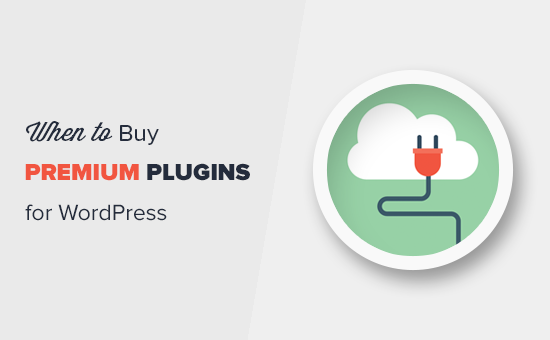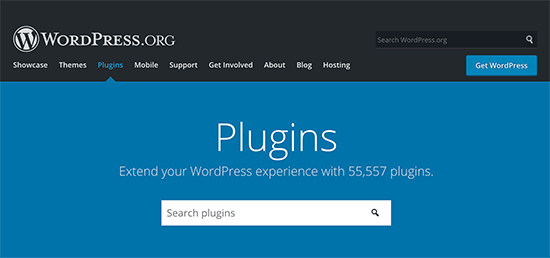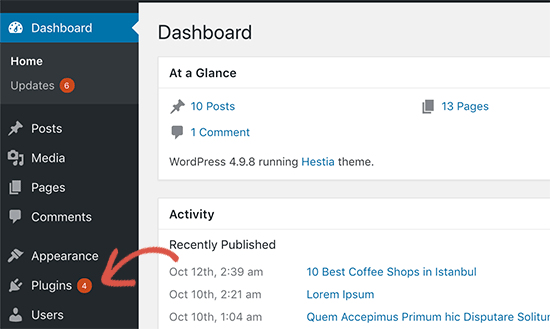We are often asked by users when is it worth investing in premium WordPress plugins? One of main reasons why WordPress is the popular website builder in the world is because it gives you access to thousands of free and paid plugins (also known as premium WordPress plugins). In this article, we will explain when is it worth buying premium or paid WordPress plugins.

What are Premium WordPress Plugins?
Premium plugins are paid version of WordPress plugins that come with additional features, priority support, documentation, and regular updates.
You can learn more about WordPress plugins by reading our beginner’s guide on what are WordPress plugins and how do they work.
WordPress has become the most popular blogging platform in the world because it has a healthy ecosystem of both free and paid plugins. At the time of writing this article, there are more than 55,000 free plugins available in WordPress.org directory. You can use these free plugins to access various features without paying anyone.

Often beginners wonder how does WordPress make money if the plugins are free. Well, WordPress does not own all these plugins.
Since WordPress is open-source, majority of these free plugins are written by third-party developers who want to give back to the WordPress community and build a brand for themselves, so they can get more client-work.
But the issue is that like any other software, WordPress plugins also need to be properly maintained and updated. Although the individual developer is not required to offer support, most of them go above and beyond to help users and even add new features as requested.
As you can imagine, all these things take a lot of time and resources. Plugin authors are often unable to give free plugins proper attention as they grow and get a larger user base.
For some plugin developers, it becomes difficult to take time out of their work and personal life to maintain a free product over a long period.
This is where premium WordPress plugins come in.
For a small licensing fee, you get access to dedicated support, guaranteed updates, and premium features. The license fee provides plugin authors steady income, so they can improve the product and dedicate more time to growing their WordPress plugin business.
On the other hand, it gives you, the customer, a more refined product with reliable support and updates.
That being said, let’s talk about when you should consider buying premium WordPress plugins.
Are Premium WordPress Plugins Worth the Money?
If you have read our guide on controlling the cost of a WordPress website, then you would know that we are not a fan of unnecessary spending.
We believe that most beginners can control their costs by using free WordPress plugins whenever they can. There are free versions for many of the the best WordPress plugins on the market. Following are just a few examples of great premium WordPress plugins offering free or lite versions.
- WPForms Lite is the best free contact form plugin.
- MonsterInsights Lite – The free version helps you easy install Google Analytics in WordPress.
- Yoast SEO – The best free WordPress SEO plugin.
- WooCommerce – WordPress ecommerce plugin to start an online store.
- SeedProd – The best a coming soon page and maintenance mode plugin.
However as your website or business grow, you will want access to more features, priority support, and reliable plugins that you can count on for regular updates.
To help you decide, we have added the top reasons that justify investing in a premium WordPress plugin.
1. Solutions Specific WordPress Plugins

There are some WordPress plugin categories that cater to very specific solutions. For example, building a membership website or selling online courses are hard work.
Free plugins alone cannot do justice to these complex solutions. Even if you find a free plugin for the job, you will likely have to purchase paid addons to support their business.
If you are building a website that requires a very specific / advanced functionality, then you will be better off with a premium WordPress plugin.
2. Advanced Features

While there are free plugins for most basic tasks, you will only find advanced features in paid plugins. That’s mainly because building and maintaining advanced features take a lot of resources.
For example, while WPForms Lite is the most beginner-friendly WordPress contact form plugin, the pro version of WPForms comes with advanced features like user registration form, surveys and polls, payment forms, etc.
3. Dedicated Support from Plugin Developers

Support is not guaranteed with free WordPress plugins because free plugin authors are not required to offer support. If you are new to WordPress with no programming skills, then support becomes crucial for you. Premium WordPress plugins give you faster email responses for your support questions.
4. Extensive Documentation and Tutorials

Premium and paid WordPress plugins provide extensive documentation to help you get started without even contacting support. Many premium WordPress plugins have docs or resources sections where you can find guides, tutorials, and video instructions. These resources help you use the plugin without waiting for someone to help you out.
5. Regular and Frequent Updates

Free WordPress plugins are sometimes abandoned by their developers. This leaves your website open to security vulnerabilities and bugs. Sometimes you might not even realize that a plugin has been abandoned until you see your site behaving strangely after updating WordPress.
Premium WordPress plugins give you regular updates to address bugs, glitches, and most importantly any security issues. You don’t have to do anything as those updates would automatically appear in your WordPress dashboard, and you can install them with just a few clicks. See our guide on how to properly update WordPress plugins for detailed instructions.
6. New Features and Enhancements
Free WordPress plugins usually don’t have an incentive to enhance and improve something that is already working for many websites.
On the other hand, paid WordPress plugins are businesses with competition. In order to stay on top, they continuously work on their products by adding new features and improving existing features. Depending on your license terms, you will get access to those features right away.
7. Supporting The WordPress Ecosystem
Premium WordPress plugin companies are small businesses. By purchasing a license, you help them build a sustainable business that provides for their families and even creates new jobs all over the world.
Your small payment helps those developers create killer products for other small businesses like yours and improve the WordPress ecosystem (See: Most influential companies in WordPress).
Frequently Asked Questions about Premium Plugins
We have answered a lot of questions about premium WordPress plugins via email. To help you find the answer quickly, we have compiled the list of the most frequently asked questions.
1. Should I only use all premium plugins on my website?
No, there is no need to only use paid WordPress plugins on your website. You should only buy premium plugins when you actually need them. There are a lot of great free plugins that have no premium alternative or are much better than their paid alternatives.
2. How do I find premium WordPress plugins?
Premium WordPress plugins are not sold on the official WordPress.org website. You can buy them from their own websites. Now the problem is that all those websites are scattered, so how do you know which plugin is good?
This is where WPBeginner can help. We are the largest WordPress resource site on the internet. We regularly write how-to’s about different free and premium WordPress plugins. We do the research for you by actually testing the plugin and breaking down their features with pros and cons.
Following are just a few plugin showcases that you’ll find on WPBeginner (they contain both free and paid WordPress plugins).
- Best contact form plugins for WordPress
- Best WordPress SEO plugins and tools
- Best WordPress security plugins
- Best WordPress backup plugins
- Best free WooCommerce plugins
- Best WordPress caching plugins
- Best WordPress membership plugins
- Best WordPress LMS plugins
- Best WordPress drag & drop page builder plugins
- Best WordPress plugins for small business
Need more recommendations? Just type in your keyword in Google and add wpbeginner.com at the end of your search term.
Another way to find great premium WordPress plugins is by upgrading to the paid plans of a free plugin that you already love and use.
3. Are all premium WordPress plugins good?
No, not all of them are great. In fact, some paid plugins can be quite terrible. That’s why you need to carefully evaluate them before making the purchase. Find out who are the people behind the plugin, what kind of reputation they have, what other people are saying about the plugin on the internet.
Whatever you do, DO NOT buy a paid plugin from an unofficial source like Fiverr. Always buy the plugins from the official author website to make sure that you’re buying the secure version of the plugin.
4. Do I need to keep paying premium WordPress plugins every year?
Once you purchase a WordPress plugin, you can keep using it for as long as you want. Premium WordPress plugins come with different licensing terms. The most common licensing term is for 1 year of updates and support. If you are on a yearly license plan, then your plugin will continue to work, but you will not get updates and support after your license is expired.
If you like the plugin you are using, then you should definitely renew your license when it expires.
We hope this article helped you learn when you should buy premium WordPress plugins. You may also want to see our guide on free vs premium WordPress themes for a similar discussion regarding WordPress themes.
If you liked this article, then please subscribe to our YouTube Channel for WordPress video tutorials. You can also find us on Twitter and Facebook.
The post When is it Worth It to Buy Premium WordPress Plugins? (Explained) appeared first on WPBeginner.
source https://www.wpbeginner.com/beginners-guide/when-is-it-worth-it-to-buy-premium-wordpress-plugins-explained/
No comments:
Post a Comment